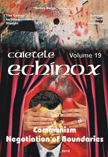Negotiating the Communist Ideological “Canon” A Case Study: Petru Dumitriu (1948-1953)
Negotiating the Communist Ideological “Canon” A Case Study: Petru Dumitriu (1948-1953)
Author(s): Andrada Fătu-TutoveanuSubject(s): Literary Texts
Published by: Universitatea Babeş-Bolyai
Keywords: Romania; Communism; Political Compromise; Negotiation; Literary Canon; Socialist Realism; Petru Dumitriu.
Summary/Abstract: The study focuses on how, after 1948, a “new” type of ideological patterns was politically imposed to literature by the Romanian communist regime. The very few valuable works escaping this ideological pattern were the result of a political compromise. This practice, to which I refer to as the “negotiation of the communist canon”, has become common in the 1950s in the Romanian culture. The study focuses on Petru Dumitriu’s case, by analysing both the literary history data and the author’s post-communist statements. The analysis deals with the author’s ambivalence, in the politically motivated literary choices, and his duplicity, during the 1950s general transformations inside the Romanian literary canon. Educated abroad and having aristocratic origins, the young writer P. Dumitriu made a radical turn in 1948 towards socialist realism and ideological articles. Besides his “exemplary” work as an agent of the regime, he also wrote some valuable works, acceptable in the aesthetic canon, works which he was allowed to publish only because of his political “faithfulness”. The study focuses precisely on the mechanism of his (gradual) compromise and his negotiation of ideological boundaries from the posture of a privileged, powerful agent of the regime.
Journal: Caietele Echinox
- Issue Year: 2010
- Issue No: 19
- Page Range: 212-228
- Page Count: 17
- Language: English
- Content File-PDF

